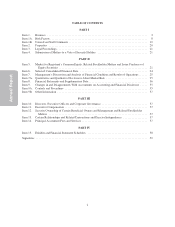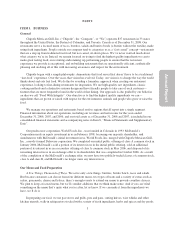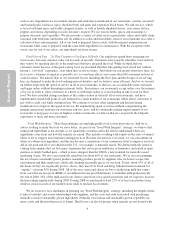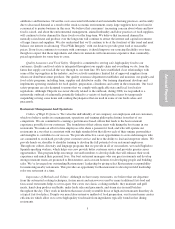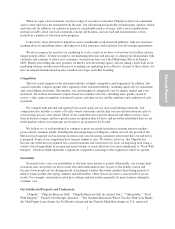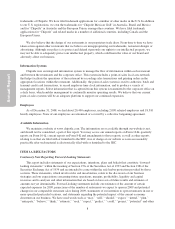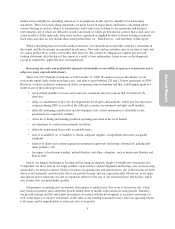Chipotle 2008 Annual Report Download - page 14
Download and view the complete annual report
Please find page 14 of the 2008 Chipotle annual report below. You can navigate through the pages in the report by either clicking on the pages listed below, or by using the keyword search tool below to find specific information within the annual report.
react to these problems by changing our menu or other key aspects of the Chipotle experience, we may lose
customers who do not accept those changes, and may not be able to attract enough new customers to produce the
revenue needed to make our restaurants profitable. Customers may also shift away from us if we choose to pass
along to consumers any higher ingredient costs resulting from supply problems associated with outbreaks of
food-borne illnesses, which would also have a negative impact on our sales and profitability.
Our business could be adversely affected by increased labor costs or difficulties in finding the right
employees for our restaurants.
Labor is a primary component of our operating costs, and we believe good managers and crew are a key part
of our success. We devote significant resources to recruiting and training our restaurant managers and crew.
Increased labor costs due to factors like competition, increased minimum wage requirements, employee benefits
and changes due to our new restaurant staffing structure would adversely impact our operating costs. Our success
also depends in part on the energy and skills of our employees and our ability to hire, motivate and keep qualified
employees, especially restaurant managers and crew members. Our failure to find and keep enough employees
who are a good fit with our culture could delay planned restaurant openings, result in higher employee turnover
or require us to change our culture, any of which could have a material adverse effect on our business and results
of operations. Restaurant operators have traditionally experienced relatively high employee turnover rates. Any
increase in our turnover rates for managers or crew could be costly.
Various states in which we operate are considering or have already adopted new immigration laws, and the
U.S. Congress has recently been considering changes to Federal immigration laws as well. Some of these new
laws may increase our obligations for compliance and oversight, which could subject us to additional costs and
make our hiring process more cumbersome, or reduce the availability of potential employees. Although we
require all workers to provide us with government-specified documentation evidencing their employment
eligibility, some of our employees may, without our knowledge, be unauthorized workers. Unauthorized workers
are subject to deportation and may subject us to fines or penalties, and if any of our workers are found to be
unauthorized we could experience adverse publicity that negatively impacts our brand.
The impact of the current economic downturn on us may be exacerbated if our suppliers, landlords and
other counterparties are not able to continue to do business with us or are forced to alter the terms on which
they do business with us.
Some of our suppliers and other vendors have been adversely impacted by tightening of the credit markets,
decreased economic activity, fluctuations in commodity prices and other consequences of the economic
downturn. Some vendors have sought to change the terms on which they do business with us in order to lessen
the impact of the economic downturn on their business. If we are forced to find alternative vendors for key
services, whether due to demands from the vendor or the vendor’s bankruptcy or ceasing operations, that could
be a distraction to us and adversely impact our business.
For example, we are aware that the economic environment has forced some food suppliers to seek financing
in order to stabilize their businesses, and some suppliers have ceased operations completely. Additional suppliers
may encounter difficulties in sustaining their business, and if any of our major suppliers or a large number of
other suppliers suspend or cease operations, we may not be able to further our “Food With Integrity” initiative
and may have difficulty keeping our restaurants fully supplied with the high quality ingredients we require. If we
were forced to suspend serving one or more of our menu items, that could have a significant adverse impact on
our restaurant traffic and public perceptions of us, which would be harmful to our business.
Similarly, our restaurant expansion strategy relies in part on the development of new retail centers and
similar projects. Many developers rely on the availability of financing to complete these types of projects, and
due to the current volatility in the credit markets financing may not be available on attractive terms or at all.
12
Annual Report


